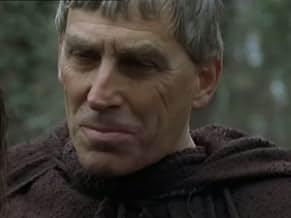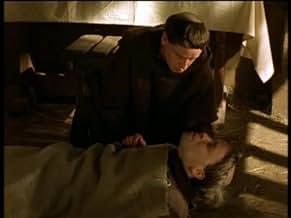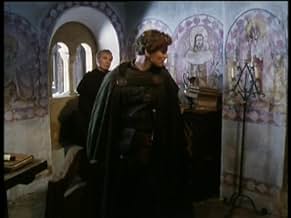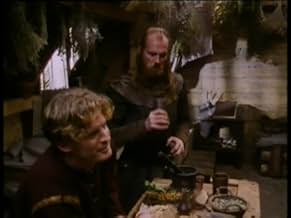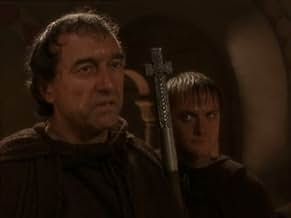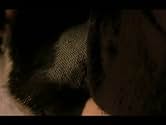Les cas de l'époque médiévale d'un croisé devenu moine qui enquête sur des mystères dans la ville anglaise normande de Shrewsbury.Les cas de l'époque médiévale d'un croisé devenu moine qui enquête sur des mystères dans la ville anglaise normande de Shrewsbury.Les cas de l'époque médiévale d'un croisé devenu moine qui enquête sur des mystères dans la ville anglaise normande de Shrewsbury.
Parcourir les épisodes
Histoire
Le saviez-vous
- AnecdotesSeveral of the names and occupations of the monks in the series are actually from a record book from the Abbey of St. Peter and St. Paul in Shrewsbury, England. Some of these include Cadfael, Robert, Jerome, and Heribut.
- GaffesFemale characters are invariably exquisitely made up with the most modern tones of foundation, blusher and lipstick. After HD was introduced this became more noticeable.
- ConnexionsFeatured in Drama Trails: 'Secret Diary of a Call Girl' to 'London's Burning' (2008)
Commentaire en vedette
Now that all 13 episodes of (Sir) Derek Jacobi's landmark mystery series "Cadfael" are now available in a single package, it's time to give this treasure a good look. The bound-leather look of the collection is nice, even if it's obviously not mediaeval. It has convenient double trays and a clever faux clasp to hold it shut.
"Cadfael" is based on the novels of Ellis Peters (pen name of Edith Pargeter). It's set in 1138-1144/5, during the spotty reign of Stephen of Blois King of England 1135-1154 and his civil war with his cousin "Empress" Maud (or Matilda). Stephen's claim to the throne was less compelling than that of Matilda (or Maud), as he was the son of William I's daughter Adela and had already sworn to support his cousin's claim. Maud's (or Matilda's) claim was better, since she was the daughter of William II. Her title "Empress" was only a courtesy because, although she had been wife to Holy Roman Emperor Henry V, she had never been crowned. Despite his oath Stephen quickly appeared to claim the throne when William II died. Matilda (or Maud) came to England in 1138 and a bitter civil war ensued. "Cadfael" begins in 1138, when Stephen seems to be gaining the upper hand. He has just captured the Shropshire area, subsequently executing a large number of his enemies thus effecting the taming of Shrewsbury.
I expect some really sincere groans after that .
Brother Cadfael is the herbalist and, in consequence, as close to a doctor as Shrewsbury Abbey is likely to get. His medical practices are fairly advanced for the time but then, any genuinely medical practices would be. Cadfael has come late to his monkish vocation, having spent 3 or 4 decades in Palestine on Crusade. He has an interesting past many details of which we learn as the series progresses. Learned for his time, and being clever and inquisitive, Cadfael's avocation is solving murder mysteries. Derek Jacobi invests the character with enormous humanity and compassion in brilliant and nuanced performances.
In fact, "Cadfael" is an ensemble of excellent performances. Not least of these is the performance of the technical staff in reproducing the squalor and degradation of living in 12th-Century England. At the height of the Little Ice Age, England was a less pleasant and productive land than it is now a situation exacerbated by the collapse of Romano-British civilization, the deep-rootedness of Christian superstition, and the triumph of Norman greed. Interestingly, this period is equally well portrayed in a comedy, the hilarious Brit series "Dark Ages".
The mysteries that involve Cadfael are complex and interesting, lasting about 1 hour 15 minutes each. His task is made more difficult by the rampant sophomoric thinking of the times and the numerous uptight personalities who think they're better than anyone else.
Speaking of personalities this series is full of them, all highly interesting and individualized, portrayed by accomplished actors. While the murders pose interesting puzzles especially in the absence of modern forensics it's the interactions of the characters that really make the stories. (As to forensics, Cadfael is surprisingly thorough and almost scientific. This is almost a century before the prime of Roger Bacon, an era of the triumph of religion and therefore the abasement of empiricism and yet, here is Cadfael.) Most of the main characters are involved in the abbey. This is, initially, headed by Abbot Heribert (oddly - for the time - spelt "Herribert"). He is played with gentle gravitas by Peter Copley. By decision of a church council, Heribert is quickly replaced by, Radulphis, played with assertive gravitas by Terrence Hardiman. Whilst Heribert tended to give Cadfael his head, Radulphus began his tenure as more skeptical of Cadfael's abilities. However, he quickly came to depend on Cadfael in difficult situations involving murder.
Cadfael's nemesis in most circumstances is Brother Robert, the abbey Prior, played with stuffy all-purpose disapproval by Michael Culver. In his grouchy skepticism, he's seconded by busybody Brother Jerome, played with prissy toadiness by Julian Firth. It's not always clear what this pair is up to, but they're always up to it together. Cadfael is assisted by young Brother Oswin, played with earnest immaturity by Mark Charnock. His clumsiness is a running joke for a time, but this is later wisely abandoned.
Cadfael's main ally is the Under Sheriff, Hugh Beringar originally a partisan of Matilda (or Maud) who ultimately swore loyalty to Stephen and was raised to his current post. He is played very authoritatively by Sean Pertwee easily the best bit of eye candy in the series. Alas, Beringar is played by 3 actors. Pertwee has the role during Season 1, Eoin McCarthy in Seasons 2-3, and Anthony Green in Season 4. The latter two do well, but the viewer misses Pertwee's affable authority. Beringar is assisted by a Sergeant, Will Warden, a hulking berserker sort, prone to arrest first and ask no questions after, played with appropriate menace by Albie Woodington. He doesn't appear in the last season, alas.
"Sheriff", by the way, should more properly be spelt "sherrif". The Old English is scir gerefa, later rendered as "shir(e) reeve" once the "ge" syllable had been lost (nasty Teutonic thing). Conflating into a single word, we should have been left with a double R (and a single F). Such are the vagaries of English. Ask me about the abomination "dwarfs" some time.
The generally top-notch actors give real life to some top-notch stories. But these are, of course, British films. It's amazing that this country, with a fine and sophisticated mystery tradition of its own, has produced little to rival the great British mystery series. Be that as it may, "Cafael" is one of those great series and this set is the most convenient and most economical way to get it.
"Cadfael" is based on the novels of Ellis Peters (pen name of Edith Pargeter). It's set in 1138-1144/5, during the spotty reign of Stephen of Blois King of England 1135-1154 and his civil war with his cousin "Empress" Maud (or Matilda). Stephen's claim to the throne was less compelling than that of Matilda (or Maud), as he was the son of William I's daughter Adela and had already sworn to support his cousin's claim. Maud's (or Matilda's) claim was better, since she was the daughter of William II. Her title "Empress" was only a courtesy because, although she had been wife to Holy Roman Emperor Henry V, she had never been crowned. Despite his oath Stephen quickly appeared to claim the throne when William II died. Matilda (or Maud) came to England in 1138 and a bitter civil war ensued. "Cadfael" begins in 1138, when Stephen seems to be gaining the upper hand. He has just captured the Shropshire area, subsequently executing a large number of his enemies thus effecting the taming of Shrewsbury.
I expect some really sincere groans after that .
Brother Cadfael is the herbalist and, in consequence, as close to a doctor as Shrewsbury Abbey is likely to get. His medical practices are fairly advanced for the time but then, any genuinely medical practices would be. Cadfael has come late to his monkish vocation, having spent 3 or 4 decades in Palestine on Crusade. He has an interesting past many details of which we learn as the series progresses. Learned for his time, and being clever and inquisitive, Cadfael's avocation is solving murder mysteries. Derek Jacobi invests the character with enormous humanity and compassion in brilliant and nuanced performances.
In fact, "Cadfael" is an ensemble of excellent performances. Not least of these is the performance of the technical staff in reproducing the squalor and degradation of living in 12th-Century England. At the height of the Little Ice Age, England was a less pleasant and productive land than it is now a situation exacerbated by the collapse of Romano-British civilization, the deep-rootedness of Christian superstition, and the triumph of Norman greed. Interestingly, this period is equally well portrayed in a comedy, the hilarious Brit series "Dark Ages".
The mysteries that involve Cadfael are complex and interesting, lasting about 1 hour 15 minutes each. His task is made more difficult by the rampant sophomoric thinking of the times and the numerous uptight personalities who think they're better than anyone else.
Speaking of personalities this series is full of them, all highly interesting and individualized, portrayed by accomplished actors. While the murders pose interesting puzzles especially in the absence of modern forensics it's the interactions of the characters that really make the stories. (As to forensics, Cadfael is surprisingly thorough and almost scientific. This is almost a century before the prime of Roger Bacon, an era of the triumph of religion and therefore the abasement of empiricism and yet, here is Cadfael.) Most of the main characters are involved in the abbey. This is, initially, headed by Abbot Heribert (oddly - for the time - spelt "Herribert"). He is played with gentle gravitas by Peter Copley. By decision of a church council, Heribert is quickly replaced by, Radulphis, played with assertive gravitas by Terrence Hardiman. Whilst Heribert tended to give Cadfael his head, Radulphus began his tenure as more skeptical of Cadfael's abilities. However, he quickly came to depend on Cadfael in difficult situations involving murder.
Cadfael's nemesis in most circumstances is Brother Robert, the abbey Prior, played with stuffy all-purpose disapproval by Michael Culver. In his grouchy skepticism, he's seconded by busybody Brother Jerome, played with prissy toadiness by Julian Firth. It's not always clear what this pair is up to, but they're always up to it together. Cadfael is assisted by young Brother Oswin, played with earnest immaturity by Mark Charnock. His clumsiness is a running joke for a time, but this is later wisely abandoned.
Cadfael's main ally is the Under Sheriff, Hugh Beringar originally a partisan of Matilda (or Maud) who ultimately swore loyalty to Stephen and was raised to his current post. He is played very authoritatively by Sean Pertwee easily the best bit of eye candy in the series. Alas, Beringar is played by 3 actors. Pertwee has the role during Season 1, Eoin McCarthy in Seasons 2-3, and Anthony Green in Season 4. The latter two do well, but the viewer misses Pertwee's affable authority. Beringar is assisted by a Sergeant, Will Warden, a hulking berserker sort, prone to arrest first and ask no questions after, played with appropriate menace by Albie Woodington. He doesn't appear in the last season, alas.
"Sheriff", by the way, should more properly be spelt "sherrif". The Old English is scir gerefa, later rendered as "shir(e) reeve" once the "ge" syllable had been lost (nasty Teutonic thing). Conflating into a single word, we should have been left with a double R (and a single F). Such are the vagaries of English. Ask me about the abomination "dwarfs" some time.
The generally top-notch actors give real life to some top-notch stories. But these are, of course, British films. It's amazing that this country, with a fine and sophisticated mystery tradition of its own, has produced little to rival the great British mystery series. Be that as it may, "Cafael" is one of those great series and this set is the most convenient and most economical way to get it.
- catuus
- 17 mai 2006
- Lien permanent
Meilleurs choix
Connectez-vous pour évaluer et surveiller les recommandations personnalisées
Détails
Contribuer à cette page
Suggérer une modification ou ajouter du contenu manquant









